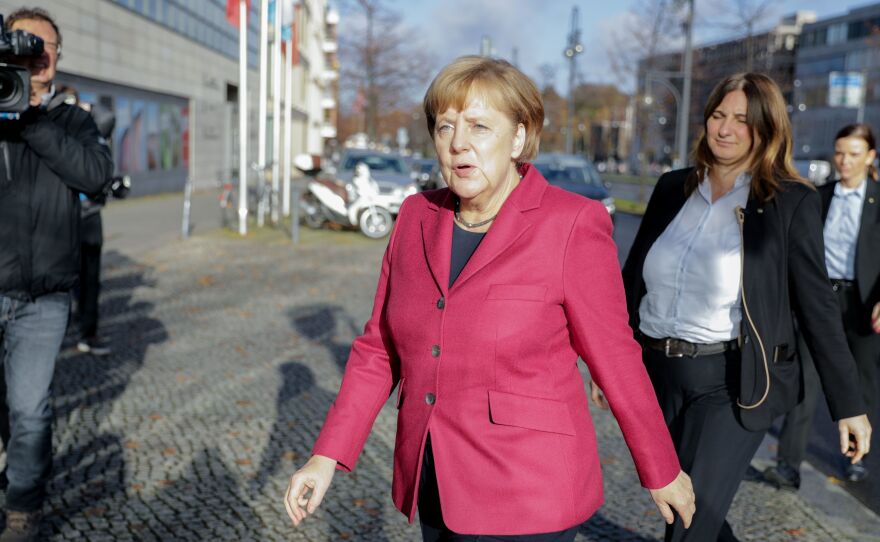For seven years, Angela Merkel has topped Forbes magazine's list of the most powerful women in the world. In the wake of populism's rise in European and U.S. politics, she's seen by many as a vital pillar of Western values and multilateralism.
But the 63-year-old chancellor of Germany could soon lose her job if she fails to form a new government.
That prospect is growing, even as the four political parties she needs for a governing coalition agreed early Friday to try one last time to overcome their seemingly insurmountable differences in the coming days.
"I think it's 'Jamaica' or it's over," warned commentator Nico Fried of the daily Sueddeutsche Zeitung, referring to the nickname Germans have given the would-be coalition, whose parties' black, yellow and green colors match those of the Caribbean nation's flag. "This could be the end of Angela Merkel."
Among the key sticking points is how Germany plans to mitigate climate change, like whether to cut back on coal use, which accounts for 40 percent of German electrical power. Or whether to allow certain categories of refugees who've been granted asylum in Germany to send for their relatives, which officials estimate would amount to 150,000 to 180,000 people. Proponents say refugees can't integrate into German society if they are forced to leave their families behind, while opponents argue Germany is already overwhelmed by asylum seekers.
That the would-be political allies are refusing to budge on their positions is no surprise, given some are longtime rivals who have never jointly governed the country before. The four parties are Merkel's conservative Christian Democratic Union and its Bavarian sibling, the Christian Social Union, the left-leaning, environmentalist Greens and the business-friendly Free Democrats (FDP).
FDP Vice-chair Wolfgang Kubicki, a veteran negotiator, told German public broadcaster ARD his party and the others remain so far apart after a month of talks that he "can't imagine how we can come together" on a compromise over the next few days.
The chancellor, who excels at forging consensus both domestically and internationally in times of crisis, hasn't managed to break the logjam. Some German analysts say it's a sign of how weak she's become politically because of her refugee policy, which involved opening Germany's doors to a million newcomers and led to some of the poorest-ever results for the parties of her last governing coalition in September's parliamentary elections.
Even so, Merkel sounded optimistic as she emerged from the negotiations in Berlin before dawn on Friday. She greeted journalists with a cheerful "Good morning" and informed them that negotiations would continue.
One reason for her optimism is that she has struggled — and succeeded — before in forming governing coalitions, including her first one in 2005, after her party defeated then-Chancellor Gerhard Schroeder's Social Democrats by a narrow margin.
And working in her favor is the one crucial point Merkel's would-be coalition partners agree on: They all want to sideline the Alternative for Germany (AfD). The right-wing, populist party, which is serving in the German Parliament for the first time, is currently the third-strongest faction. According to recent polls, it would likely gain more seats if new elections are called.
All other parties elected to the German Parliament denounce the AfD and vow to block its agenda, which they say is nationalistic and xenophobic.
Merkel's calm and reflective leadership style is also ideal for governing a diverse coalition, says Ursula Muench, who runs the Academy for Political Education near Munich.
"You can accuse Chancellor Merkel of a lot of things, but she is a great tactician," Muench says. "She's succeeded time and again in getting her European partners to reach a consensus."
But what will happen if she fails to form a new coalition government?
- Merkel could try to persuade her previous coalition partner, the Social Democratic Party, to join her in the next government, which would give her a majority in the German Parliament. The center-left party has so far refused, saying it wants to rebuild its base and keep the right-wing populists from becoming the largest opposition party in parliament.
- Merkel could form a government with less than a majority in Parliament, which is unprecedented in the federal republic and critics warn is a recipe for gridlock. It would require a majority of German members of Parliament to vote that she continue as chancellor.
- The prospective coalition partners could demand Merkel be replaced by another chancellor candidate as a condition for new negotiations, although this scenario is seen as unlikely.
- The German president could dissolve Parliament and call for new elections, which would also be unprecedented in postwar Germany and could not happen until Merkel fails to win an absolute majority in two parliamentary votes and a plurality in a third vote.
Merkel's chief of staff Peter Altmaier told ARD TV that he's confident a Jamaica coalition will happen.
"We have a responsibility to our country and I'm convinced most of the people negotiating with me see it the same way," he said.
Even if he's right, many analysts predict Merkel will have a hard time accomplishing much during her next term – which could well be her last.
"It's going to be harder for her" than before, says Uwe Jun, a political scientist at the University of Trier. "Her job – and we see that now with the exploratory talks – is primarily to hold the whole thing together and to moderate" them.
As a result, he says, Merkel might choose to spend more time on European and other international affairs and leave the domestic agenda to her divergent coalition partners.
Copyright 2017 NPR. To see more, visit http://www.npr.org/.






